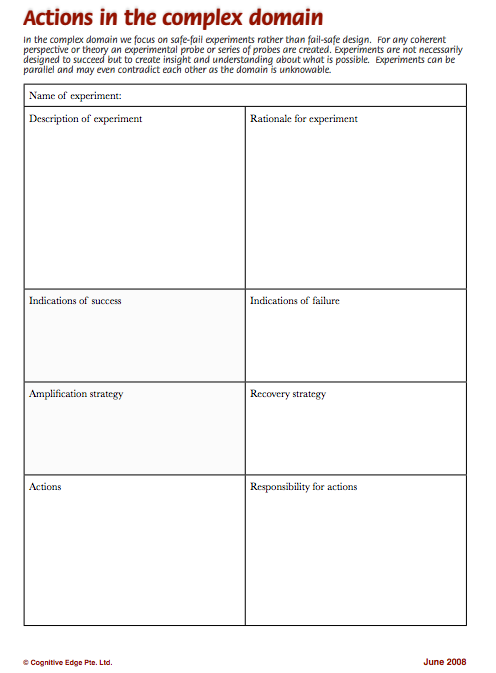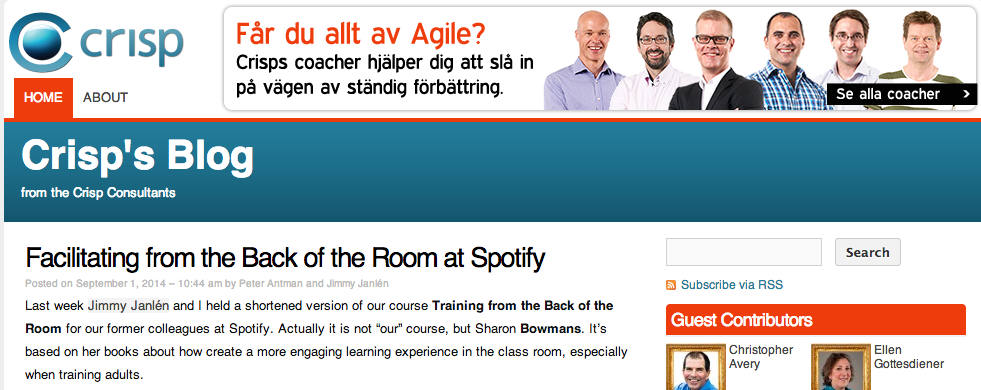overcoming your fear of change
Three techniques to drive continuous improvement through experimentation
Laura Burke
@agilenvironment
Discussion
Pair up
Discuss: (3 min per person)
What are some of the changes or improvements that you've made in your Agile adoption?
What techniques have you used to make these changes?
What are the biggest barriers to change?
Share at the end
Discuss: (3 min per person)
What are some of the changes or improvements that you've made in your Agile adoption?
What techniques have you used to make these changes?
What are the biggest barriers to change?
Share at the end
agile requires constant change
no matter how far along on your transformation you may be, you need a way to manage it
Use experiments,
prepare for the complex

overview
Why experiment?
How are people doing this today?
3 Techniques
Getting started
Close and Q&A
Why experiments?

But experts know what to do,
right?


http://freakonomics.com/2011/06/30/freakonomics-radio-hour-long-episode-4-%E2%80%9Cthe-folly-of-prediction%E2%80%9D-2/
bias
Business Insider's 57 "most notable"
information bias
hindsight bias
priming
post-purchase rationalization
recency
reciprocity
status quo bias
http://www.businessinsider.com/cognitive-biases-2014-6?op=1
Experimentation:
it's happening

lean startup


design thinking

Philosophy
Techniques
Cynefin framework
Image credit: Karl Scotland, http://www.infoq.com/articles/kanban-heuristics-common-sense
In the complicated domain there are right answers which can be discovered either by deployment of expertise or research of some type.
In the complex domain we focus on safe-fail experiments rather than fail-safe design.
Experiments are not necessarily
designed to succeed but to create insight and understanding about what is possible.
Experiment #1

http://cognitive-edge.com/
Lean

http://hakanforss.wordpress.com/2012/09/14/lean-lego-the-red-brick-cancer/
What is an a3?

A3 Proposals typically use the word "countermeasure" rather than "solution."... the wording recognizes that even apparent "solutions" inevitably create new problems.
http://sloanreview.mit.edu/files/2009/07/50408-s2.pdf
Experiment #2: Problem A3
http://www.reliableplant.com/Read/22984/a3-problem-solving-lean
More information: http://sloanreview.mit.edu/files/2009/07/50408-s2.pdf
examples:
"Every A3 is no more than a visual manifestation of a problem-solving thought process involving continual dialogue between the owner of an issue and others in the organization. "

toyota kata-inspired

http://hakanforss.wordpress.com/2012/04/25/agile-lego-toyota-kata-an-alternative-to-retrospectives/
Retrospectives

Experiment #3: IMPROVEMENT THEME

http://blog.crisp.se/2013/05/14/jimmyjanlen/improvement-theme-simple-and-practical-toyota-kata
Things to remember
Talk to people
Identify the problem first
Don't change too many conditions at once
Limited WIP is your friend
Start small
Take biases into account
develop your own experiment
- Work individually
- Think about a problem that you want to
try to work through - Decide on an experiment format
- Spend 5 minutes working through a draft
- Share with a partner
Use simple,
disciplined experiments
to manage change in
your organization

[Successful] change
Requires disciplined
experimentation
take what you've started,
share it with someone by friday
you'll learn if the changes you're making are creating the impact you intend
Q&A
Using Experiments, Fear of Change
By Laura Burke
Using Experiments, Fear of Change
- 2,594












